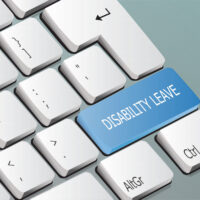Can I be Fired while on Leave for Disability?

California is an “at-will” employment state, meaning that employers can fire their workers for just about any reason or no reason at all. California does, however, protect employees from being terminated based on a legally-protected status (such as race, gender, age, etc.) or for exercising a legally-protected right such as reporting harassment or discrimination. California law also grants workers certain rights when it comes to leave for injury or disability. Can your employer terminate you while you are on leave for disability? Continue reading for an understanding of your rights while on disability, and reach out to a dedicated California wrongful termination lawyer with any questions or for help with an employment-related matter.
Disability insurance does not help you
If you suffer a severe injury at work, you may become “disabled,” meaning you have an impairment that substantially limits one or more major life activities, including fulfilling your work duties. You may be entitled to coverage under either short-term or long-term disability insurance. Collecting workers’ compensation disability benefits is different from taking medical leave, however. You may find yourself unable to work for an extended period. Disability insurance may cover you financially, but it does not protect your job if you are on medical leave for too long. Thankfully, other federal and state laws may protect you.
Federal protections: Family and Medical Leave Act and the Americans With Disability Act
The federal Family and Medical Leave Act (FMLA) also grants workers minimum leave for medical issues. Workers across the country must be allowed up to 12 weeks of unpaid leave per year to deal with their own medical problems or to care for a sick member of their immediate family. Employers cannot terminate a worker who appropriately requests for and utilizes 12 weeks of leave, but if an employee extends leave beyond those 12 weeks, they can be legally terminated. If you take time off due to disability, many employers will require that you use your FMLA leave while receiving disability payments.
Not all employers are subject to the FMLA. The FMLA applies to any employer with more than 50 employees who work within 75 miles of each other and applies only to workers who have worked at least one year for the employer and at least 1,250 hours in the prior year. Workers for small businesses are not protected.
The federal Americans With Disability Act (ADA) also protects workers. Covered employers (any business with 15 or more employees) must make reasonable accommodation for a disabled employee as long as it will not cause the employer “undue hardship.” Employees bear the burden of telling their employer about a disability, but the employer must then work to make a reasonable accommodation. An employer cannot terminate an employee who can, with reasonable accommodation, perform the essential functions of their job. The employer cannot terminate an employee while on leave to avoid making disability accommodations upon the employee’s return. Reasonable accommodation can be anything from changing job duties, acquiring tools to aid a disabled worker (braille, handrails, etc.), or granting additional unpaid leave, as long as it does not cause the employer undue hardship.
California protections: The California Family Rights Act and the Fair Employment and Housing Act
The California Family Rights Act (CFRA) tracks the same protections and the same requirements as the FMLA. However, if the leave is to take care of a newborn child, CFRA applies to businesses with 20 employees, meaning it has a broader application than the FMLA. Also, pregnancy leave is not covered under CFRA but is covered by California’s Pregnancy Disability Leave Law, again offering more protection than federal law. Your employer must return you to your previous or an equivalent position once you return from CFRA leave.
The Fair Employment and Housing Act (FEHA) protects workers from discrimination, including disabled workers. As with many California employment laws, the FEHA is broader than the ADA. It applies to employers with five (5) or more employees and states that the ADA’s protections for disabled workers are not as great as California’s.
Notably, under either federal or state law, the question is not when an employee was fired but why. If an employer can demonstrate that an employee deserved to be fired, and perhaps was about to be fired, and then took an unexpected leave, the fact that the employee was terminated while on medical leave is not entirely definitive. Termination cases can be complex, especially in these sorts of situations where multiple factors led to termination. A seasoned employment discrimination and wrongful termination attorney can help you evaluate your case.
An Experienced California Employment Attorney Can Help You Understand Disability and Leave Issues
If you are a San Francisco employer or an employee needing personal assistance with a claim of wrongful termination, retaliation, or workplace discrimination, contact the Richard Koss Bay Area employment law attorneys at 650-722-7046 on the San Francisco Peninsula, or 925-757-1700 in the East Bay.


